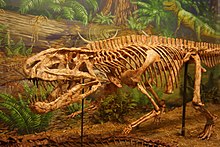Rauisuchidae is a group of large (up to 6 metres (20 ft)[1]) predatory Triassic archosaurs. Some disagreement exists over which genera should be included in the Rauisuchidae and which should be in the related Prestosuchidae and Poposauridae, and indeed whether these should even be thought of as separate valid families. Rauisuchidae in the modern sense was defined by Sterling Nesbitt in 2011 as the most inclusive clade containing Rauisuchus tiradentes, but not Prestosuchus chiniquensis, Poposaurus gracilis, or Crocodylus niloticus (the Nile crocodile).[2] In this modern sense, rauisuchids are recovered as members of the clade Loricata, being the sister taxon of Crocodylomorpha (the group including living crocodilians), and being more derived than taxa such as Prestosuchus and Batrachotomus.[2] Rauisuchids occurred throughout much of the Triassic, and may have first occurred in the Early Triassic if some archosaurian taxa such as Scythosuchus and Tsylmosuchus are considered to be within the family.[3]
| Rauisuchids Temporal range:
| |
|---|---|

| |
| Mounted skeleton of Postosuchus kirkpatricki in the Museum of Texas Tech University | |
| Scientific classification | |
| Domain: | Eukaryota |
| Kingdom: | Animalia |
| Phylum: | Chordata |
| Class: | Reptilia |
| Clade: | Archosauria |
| Clade: | Pseudosuchia |
| Clade: | Loricata |
| Family: | †Rauisuchidae Huene, 1942 |
| Genera | |
| Synonyms | |
An early cladistic analysis of crocodylotarsan (pseudosuchian) archosaurs included Lotosaurus, Fasolasuchus, Rauisuchus, and "the Kupferzell rauisuchid" (later called Batrachotomus) within the Rauisuchidae.[4] However, a later study found that Batrachotomus was a more basal pseudosuchian only slightly more "advanced" than Prestosuchus.[5] In addition, the toothless Lotosaurus has been found to be more closely related to the Ctenosauriscidae, a clade of poposauroids with sails on their backs.[6]
Two genera, previously classified as poposaurids, are in fact rauisuchids. These include Teratosaurus[7][8] and Postosuchus.[9]
Genera
edit| Genus | Status | Age | Location | Unit | Notes | Images |
|---|---|---|---|---|---|---|
| Valid | Late Triassic | Morocco | Named for the Moroccan fossil site where it was discovered, the Argana Basin. Its phylogenetic placement is uncertain. | |||
| Valid | Anisian | China | May be a chimera of fossils from the erythrosuchid Shansisuchus and an indeterminate archosaur. | |||
| Valid | Ladinian | Russia | Placement uncertain | |||
| Valid | Carnian | Poland | ||||
| Valid | Late Triassic | US | Chinle Formation |
One of the most well-known genera of Rauisuchidae | ||
| Valid | Carnian | Brazil | Santa Maria Formation | Placement uncertain | ||
| Valid | Late Triassic | Brazil | ||||
| Scolotosuchus | Valid | Olenekian | Russia | Lipovskaya Formation | ||
| Valid | Norian - | Germany | Löwenstein Formation | Once considered an early carnosaurian dinosaur | ||
| Valid | Late Triassic | India | Tiki Formation | Placement uncertain | ||
| Valid | Norian | US | Chinle Formation | |||
| Valid | Anisian | Russia | May be an erythrosuchid | |||
| Valid | Olenekian | Russia | Placement uncertain |
References
edit- ^ Weinbaum, J. C. (2013). "Postcranial skeleton of Postosuchus kirkpatricki (Archosauria: Paracrocodylomorpha), from the upper Triassic of the United States". Geological Society, London, Special Publications. 379 (1): 525–553. Bibcode:2013GSLSP.379..525W. doi:10.1144/SP379.7. S2CID 129092753.
- ^ a b Nesbitt, S.J. (2011). "The early evolution of archosaurs: relationships and the origin of major clades". Bulletin of the American Museum of Natural History. 352: 1–292. doi:10.1206/352.1. hdl:2246/6112. S2CID 83493714.
- ^ Gower, D. J.; Sennikov, A. G. (2003). "Early archosaurs from Russia". In Benton, M. J.; Shishkin, M. A.; Unwin, D. M. (eds.). The Age of Dinosaurs in Russia and Mongolia. Cambridge: Cambridge University Press. pp. 140–159.
- ^ Parrish, J. M. (1993). "Phylogeny of the Crocodylotarsi, with reference to archosaurian and crurotarsan monophyly". Journal of Vertebrate Paleontology. 13 (3): 287–308. doi:10.1080/02724634.1993.10011511. S2CID 84288744.
- ^ Gower, David J. (2002). "Braincase evolution in Suchian Archosaurs (Reptilia: Diapsida): Evidence from the Rauisuchian Batrachotomus kupferzellensis". Zoological Journal of the Linnean Society. 136 (1): 49–76. doi:10.1046/j.1096-3642.2002.00025.x.
- ^ Nesbitt, S.J. (2005). "Osteology of the Middle Triassic pseudosuchian archosaur Arizonasaurus babbitti". Historical Biology. 8 (1): 19–47. doi:10.1080/08912960500476499. S2CID 84326151.
- ^ Long, Robert A.; Murry, Phillip. A. (1995). "Late Triassic (Carnian and Norian) tetrapods from the southwestern United States". New Mexico Museum of Natural History and Science, Bulletin. 4: 1–254.
- ^ Galton PM, Walker AD. (November 1996). "Bromsgroveia from the Middle Triassic of England, the earliest record of a poposaurid thecodontian reptile (Archosauria: Rauisuchia)". Neues Jahrbuch für Geologie und Paläontologie, Abhandlungen. 201 (3): 303–325. doi:10.1127/njgpa/201/1996/303.
- ^ Weinbaum, J.C.; Hungerbühler, A. (2007). "A revision of Poposaurus gracilis (Archosauria: Suchia) based on two new specimens from the Late Triassic of the southwestern U.S.A." Paläontologische Zeitschrift. 81 (2): 131–145. doi:10.1007/BF02988388. S2CID 84822632.
External links
edit- "Taxon Search – Rauisuchidae". Taxonsearch. Archived from the original on 2007-03-11.
- "†Rauisuchidae - rauisuchids". Mikko's Phylogeny Archive. Archived from the original on 2006-09-27.
- "Re: Postosuchus/Rauisuchus". Dinosaur Mailing List archives. Archived from the original on 2016-08-06.
- "Rauisuchidae". Dinosaur Mailing List archives. Archived from the original on 2020-05-30.